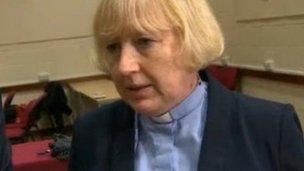Archbishop of Wales hopes no one 'lost' over women bishops
- Published
The Church in Wales made history by voting to accept women bishops.
The Archbishop of Wales said he hoped no-one would be "lost" from the Church in Wales after its landmark decision to allow women bishops.
Dr Barry Morgan has pledged to talk to those Anglicans who "find the decision difficult".
The Church's governing body voted overwhelmingly in favour of the change on Thursday. A similar vote in 2008 was narrowly defeated.
In England, the issue is due to be discussed again in November.
Despite female bishops being allowed in Northern Ireland and Scotland, none have been elected yet.
The vote at the University of Wales Trinity Saint David in Lampeter, Ceredigion, led to huge cheers as the result was announced.
But it has also led to some traditionalists saying the decision may lead them to consider their future within the Church.
Canon Jenny Wigley, Rector of Radyr, whose successful amendment to the bill was instrumental in ensuring the vote had a yes or no outcome, said she hoped women in the Church of England would be encouraged by the result.
"Sisters across Offa's Dyke, look to us," she said.
'Promise'
The vote leaves the bishops to write a code of practice for those who cannot "accept the authority of women bishops".

Canon Jenny Wigley: "Sisters across Offa's Dyke, look to us."
Dr Morgan said: "I hope it will be possible that no-one will be lost. It's a matter now for discussion.
"I promise on behalf of the bench of bishops that we will talk to a range of people across the Church.
"We'll come back in April to hear what people have to say but in the end the bishops will have to draw up the code of practice."
In the breakdown of the vote, the laity voted 57 for, 14 against, with two abstentions; the clergy section saw 37 voting for and 10 against, while the bishops voted unanimously in favour.
Retired Father Alan Rabjohn, a traditionalist and chairman of Credo Cymru (Forward in Faith Wales), said: "There is still a lot to be dealt with.
'Different world'
"The bishops said they would care for us. That sounds to me like 'we'll look after this lot until they die out'.
"We are not going away. We are here like our brothers and sisters who believe in women bishops," he told BBC Radio Wales.
"They have now got to really start talking to people. Not telling us what we need for terminal care but asking us what we need to go on living alongside our brothers and sisters and proclaiming the gospel.
One of those who spoke against, Dr Elliott King, said he was still hopeful differences could be overcome.
"Personally I'm disappointed that the bill has passed but we have a great opportunity now over the next 12 months to work together to find a way forward for us all to stay within the Church."
The Venerable Peggy Jackson, Archdeacon of Llandaff, Cardiff, who proposed the amendment with Canon Jenny Wigley, said: "This morning I wake up in a completely different world."
She said yesterday's vote "was the day discrimination against women came to an end" but added that people from both sides of the argument had to live together.
"The important thing is to live together in graciousness and gentleness."
- Published12 September 2013
- Published12 September 2013